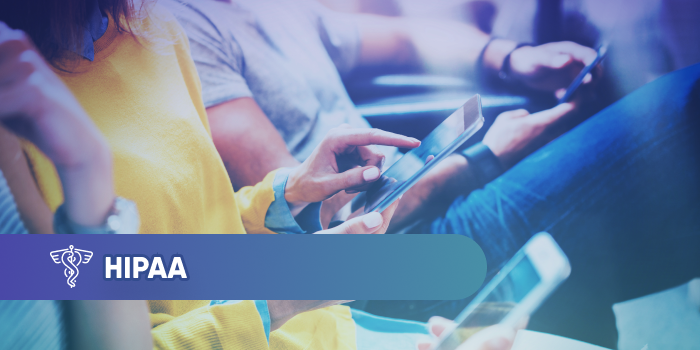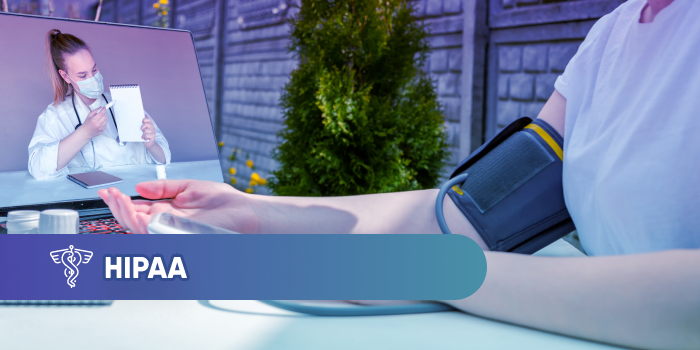5 Critical Rules to Remember When Texting Patients
Texting is popular in business communication today. A survey from Kentico revealed that almost 70% of respondents thought it was valuable to receive...

To be HIPAA-compliant when using mobile devices, healthcare professionals need to set up communication protocols that safeguard patient health information (PHI). Curogram’s HIPAA-compliant text messaging platform, for example, offers a secure way to communicate, engage, and provide quality patient care.
There is an increasing interest in on-demand healthcare, such as telehealth, partly because of the COVID-19 pandemic. Thankfully, telehealth is as easy as texting or calling a friend or ordering a pizza with a mobile device. For a medical practice using telehealth, though, it’s inevitable that the process requires transmitting protected patient health information (PHI). To avoid penalties and criminal charges, compliance with the Health Insurance Portability and Accountability Act of 1996 (HIPAA) is necessary for healthcare professionals (HCPs) and medical practices who use telehealth.
Any form of telehealth requires HIPAA compliance, but let’s explore how to be HIPAA-compliant when using mobile devices.
Providing remote healthcare has been around since the idea of home- and community-based care came out first in 1879 using the telephone to reduce unnecessary office visits. The demand for virtual care continued to rise with time, and information technology advancements kept up.
Mobile computing devices such as smartphones and tablets, for example, came onto the scene and have made it more convenient for people to communicate. Mobile devices have become the most viable option for the healthcare industry to implement cost-effective and efficient patient-centric care models.
Statistics estimate the number of smartphone users in the United States to reach 298 million in 2021. And, according to a survey, Americans check their cellphones 262 times a day, on average.
Therefore, it is relevant that HCPs use mobile devices to communicate, engage, and provide care for patients. It's where they look for providers (e.g., search engines, social media, healthcare rating websites), and mobile devices make them easy to reach.
Mobile devices also provide HCPs with various apps useful in medical practice, such as task management, data storage, time tracking, health record management, medical education and training, and patient monitoring.
Furthermore, mobile devices allow HCPs to facilitate what most patients prefer when communicating with them over other means such as emails and phone calls: texting.
HCPs benefit from implementing text messaging with patients as it reduces their staff’s time spent on the phone by 50% — Phone calls take away valuable time from your team. Responding to a text message can take less than 10 seconds!
Text messaging through mobile devices is valuable for any medical office to promote patient satisfaction and increase revenue because of the time savings. Your staff has more time to focus on other matters like admitting more patients, providing more care to many patients, and implementing marketing strategies to acquire new patients.
Now, it brings us back to the challenge of protecting sensitive and protected PHI when communicating with mobile devices. HIPAA compliance is paramount when using text messaging in medical practice.
When using mobile devices to communicate with your patients, it is imperative to abide by HIPAA guidelines and only send secure messages.
HIPAA is a federal law protecting medical records and other protected patient health information when sharing and accessing them through, for example, mobile devices and the cloud.
HIPAA includes a Privacy Rule that regulates how covered entities, such as doctors, insurance companies, and healthcare technology companies, can use and disclose certain identifiable health information.
PHI includes:
There are ways to protect and secure health information when using mobile devices that individual providers and patients can implement by themselves. But, they are not very simple, nor can you guarantee that a patient complies, which means you may think the data is secure. But it is not, making you in breach of HIPAA compliance for sending PHI over an unsecured channel or to an unsecured mobile device.
Here are examples of methods that can keep information secure on a mobile device:
As you can see, requiring your patients to do any of the above to make sure their PHI is secure when communicating with you is a huge task—it’s quite impossible, really. Curogram has a much easier option with its HIPAA-compliant communication platform.
Although the protocols above already provide layers of protection to sensitive medical information, most are impossible to control because you don’t have access to your patient’s mobile device. HCPs remain vulnerable to violating HIPAA regulations if they blindly trust their patients to implement or follow guidelines.
On an important note, using standard SMS applications on a mobile device to send messages with PHI is non-compliant with HIPAA. Text messages and documents with PHI need extra encryption to pass HIPAA standards. Popular and free messaging apps, like Google Voice and WhatsApp, are non-compliant with HIPAA, too, as are other consumer texting apps like Facebook Messenger, Skype, and Telegram.
On a positive note, you can use Curogram’s secure messaging solutions to enable you to communicate with patients and other providers from your desktop or mobile device — they’re 100% HIPAA-compliant and easy to use!
Curogram’s HIPAA-compliant applications encrypt all the medical records saved in your mobile device and the messages that contain PHI you send out and receive.
The security and peace of mind you receive with Curogram’s applications are priceless, and you know you’re avoiding HIPAA violations and potential penalties and criminal liabilities.
To help sort through your options for finding the best HIPAA-compliant messaging options from Curogram, decide how you want to communicate with protected data, with patients, internally between your staff, other providers, or all of them.
Curogram can handle any or all internal and external messaging. It offers HIPAA-compliant features that other available platforms do not allow or are limited. These functionalities include sending appointment reminders and other messages to patients, internally with staff or outside the practice, and booking appointments, all by secure texting.
Curogram is also a leading patient-centered software that uses the latest technology to integrate with any EHR. Curogram’s ability to integrate with app-based, cloud-based, server-based, and web browser-based EHRs helps providers across the country deliver secure, HIPAA compliant patient communications via any type of device.
Use HIPAA-compliant software, systems, or third-party applications like Curogram that have the Compliancy Group's Seal of Compliance for your practice. Ignoring HIPAA compliance is tantamount to utter disregard for the protection and privacy of basic and sensitive patient health information.

Texting is popular in business communication today. A survey from Kentico revealed that almost 70% of respondents thought it was valuable to receive...

Sharing laboratory test results is crucial to the medical treatment process. It allows healthcare providers to explain what the test results indicate...

Healthcare providers implement patient engagement activities to keep up with the high demand for patient-centric care models that promote...